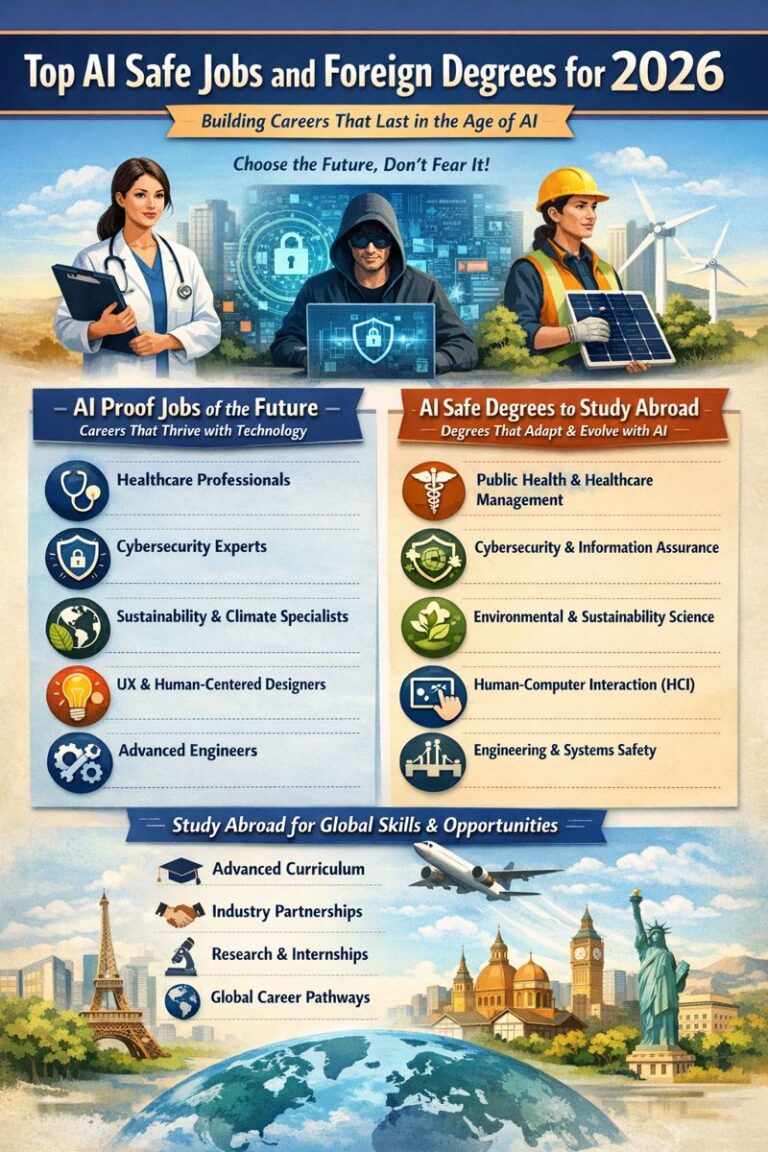If you are a mid-career manager who wants an international credential without pausing your job or family life, the UK’s Executive MBA (EMBA) format is designed for you.
Leading schools such as London Business School (LBS) and Oxford Saïd teach their EMBAs in modular blocks every 4-6 weeks; — no year-long career break needed.
On graduation you can apply for the UK Graduate Visa, which currently lets master’s graduates stay and work in Britain for up to two years (three for PhDs), which gives you time to test the UK market or rotate with your employer’s UK office.
Indian student groups have welcomed the UK government’s recent decision to keep this route, even while other migration rules tighten.
Add in the UK’s strong links with India’s tech, finance and consulting sectors, and an EMBA can upgrade your global network while you keep drawing an Indian (or overseas) salary. The sections below explain how the format works and how it differs from a traditional full-time MBA.
What is an Executive MBA?
An Executive MBA is a part-time master’s in management for experienced professionals. Typical classmates are in their late-30s to early-40s with 12-16 years of work experience and at least five years in a managerial role. (Imperial College’s 2026 cohort, for example, averages 16 years.)
Structure
- Modular delivery: teaching happens in concentrated blocks — at LBS, core courses run over 16 Friday–Saturday pairs in Year 1; some streams mix face-to-face and online sessions to cut travel.
- Duration: most UK EMBAs span 20-24 months. Oxford offers two intakes (January or September) lasting 22 or 24 months and including 14-18 one-week modules.
- Global exposure: many programmes insert study trips or modules in other financial hubs.
- Immediate application: assignments draw on your live business challenges, so new tools feed directly into your day-job.
Because you keep working, you continue to earn, protect seniority and can claim partial or full fee support from your employer. For executives juggling busy roles and family commitments, the block-week format means you plan travel well in advance and minimize time away.
Executive MBA vs. traditional MBA
| Feature | Executive MBA | Traditional UK MBA (full-time, 1 year) |
| Typical age / experience | 38-40 yrs; 12-16 yrs work exp | 27-30 yrs; 3-5 yrs work exp |
| Delivery | Part-time, modular (week-long blocks or alternate weekends); keep job | Daily, campus-based classes; career break |
| Duration | 20-24 months | 10-15 months |
| Employer sponsorship | Common: 17 % fully funded, 29 % partially funded worldwide in 2020; trend is falling but still over half get some help. | Rare; most students self-fund or take loans |
| Opportunity cost | Low – salary continues | High – forego at least one year of pay |
| Peer network | Senior leaders across industries and geographies | Early-career professionals seeking career switch |
What Does This Mean For You?
- Learning style: EMBA teaching assumes you bring real cases from work; classmates debate at a strategic level.
- Career goals: EMBAs are ideal for accelerating in your current company, launching a venture with established contacts, or moving into C-suite roles.
- Time commitment: expect 15-20 hours of reading and project work between modules; careful calendar planning is essential if you travel extensively for work.
- Return on investment: because you keep earning, the payback period is often shorter, even though tuition fees are similar to a full-time MBA at the same school.
In short, choose an EMBA if you are an experienced professional who needs advanced management training while staying employed; choose a traditional MBA if you are earlier in your career and ready for a full-time campus immersion.
Eligibility (entry requirements) for Executive MBA in the UK
UK business schools lay out clear, published criteria, but they will consider individual circumstances. Below is the common baseline you should expect:
| Requirement | Typical expectation | What it means for Indian applicants |
| Managerial experience | 5–10 years, including people, budget or project responsibility | Oxford asks for at least five years’ managerial work; many admits have 10–15 years. |
| Academic background | UK 2:1-equivalent bachelor’s (≈ 60 % or first-class) | Strong professional track records can offset borderline grades. |
| Admission test | GMAT or Executive Assessment (EA) | Waivers exist for seasoned leaders—Cambridge lets you request one during the application. |
| English proficiency | IELTS 7.0 / TOEFL 100 (if your degree was not in English) | Proof can be waived if your bachelor’s was taught fully in English. |
| References & essays | 2 professional referees, leadership and career-vision essays | Start lining up referees early so Indian holiday calendars don’t delay you. |
Tip for Indian readers: most schools value quality of leadership over job title.
Use your CV and essays to quantify team sizes, budgets, and impact in rupees, pounds, and percentages so the admissions team can benchmark you against global peers.
If you are a family-run-business executive, add a short paragraph explaining governance and reporting lines—the UK panel may not be familiar with your structure.
Cost of an Executive MBA in the UK
| School (2025 intake) | Tuition* | Typical programme length |
| London Business School (London stream) | £129,950 | 20 months |
| Oxford Saïd | £124,920 | 22–24 months |
| Cambridge Judge | £93,345 (UK-based EMBA) | 20 months |
| Warwick Business School | £55,860 (blended) | 24 months |
| Imperial College Business School | £67,500 (estimate) | 23 months |
| Henley Business School | £49,500 (Global EMBA) | 21 months |
*Includes core teaching, assessment and most study-materials. Travel, visas and accommodation are extra.
Living & Travel Costs
For your Student- (or Short-term) Visa, you must show £1,483 per month in London or £1,136 outside London (up to nine months).
Most Indian EMBA candidates budget £12,000–£18,000 a year for flights, stay during modules, and subsistence.
How Indian Candidates Finance the Bll
- Employer sponsorship – still the single biggest source; LBS reports 30% of its EMBA class receiving full or partial company funding.
- Scholarships & bursaries
- Chevening – covers full fees and stipend for Indian citizens with ≥ 2 years’ work experience.
- Felix – full ride at Oxford/Reading/SOAS for academically outstanding Indians.
- School-specific awards (e.g., Cambridge Merit Bursary, Henley Women in Leadership).
- Indian & UK bank loans – SBI Global Ed-Vantage, HDFC Credila and Prodigy Finance lend against UK EMBAs; interest is 10–13 % in INR and 9–11 % in USD/GBP.
- Tax relief – if your Indian employer pays, the fee is a deductible business expense; if you self-fund, you can claim Section 80E interest relief on an education loan.
Bottom line: allow ₹95 lakh–₹1.4 crore for a London EMBA with flights and stay, or ₹65–₹80 lakh outside London. Early employer conversations and scholarship applications (usually Nov–Mar) keep your out-of-pocket costs down.
Note: Applying for an Executive MBA in the UK involves significant financial planning, especially given the high tuition fees and living costs. This is where GradRight’s loan search platform can be a game-changer for Indian EMBA candidates. It connects you with over 15 trusted banks and NBFCs, offering personalized loan options tailored to your profile and financial background. The platform provides transparent interest rates, repayment terms, and no-cosigner, no-collateral options, helping you find affordable loans to fund your EMBA.
With expert financial advisors available to assist you in negotiating better terms and lower interest rates, GradRight helps reduce your overall repayment burden. Plus, you can compare multiple loan offers side by side, ensuring you make a well-informed decision to support your career growth without unnecessary financial stress.
Top Executive MBA programmes in the UK
| School & city | Notable facts (2025 intake) | Why it stands out |
| Oxford Saïd – Oxford | FT 2024 global rank #11; QS 2025 Global EMBA #1 • 14–18 one-week modules over 22–24 months • Fee £124.9k | Highest UK salary in FT table: US $345,976 three years out • Two intakes (Jan/Sep) suit Indian financial-year planning |
| London Business School – London | FT 2024 rank #16 • 20-month Friday/Saturday format • Fee £129.9k | London location + salary today US $314,034 drives ROI; Dubai stream optional |
| Cambridge Judge – Cambridge | FT 2024 rank #25 • 16 residential weeks across 20 months • Fee £93.3k | GMAT/EA waivers for senior leaders; smaller 100-student cohort prized for close networking |
| Warwick Business School – Coventry & London | FT 2024 rank #30 • 24 months, one four-day block each month • Fee £54.6k | Value-for-money champion; 70 % salary uplift, US $208,878 average pay |
| Imperial College Business School – London | EMBA rank #25 (2023) • 23 months; strong tech & healthcare electives • Fee ~£67.5k | STEM-heavy network plus #2 globally in FT Online MBA 2025—good hybrid options |
| Henley Business School – Reading | FT 2024: top-10 UK for salary; 49 % rise post-EMBA • Global EMBA 21 months, three international study trips • Fee £49.5k | Lowest tuition among triple-accredited UK schools; flexible “block plus online” schedule |
How to shortlist
- Schedule fit: Oxford’s one-week blocks mean fewer UK trips; LBS uses alternate weekends—easier if you can hop on a Friday evening flight.
- Specialisation: Imperial for tech leadership, Henley for family-business electives, Cambridge for entrepreneurship labs.
- Network location: If you plan to stay in India, pick the alumni base that matches your sector; Warwick and Henley have large Indian chapters in Delhi, Mumbai, and Bengaluru.
Note: Choosing the right Executive MBA program means balancing schedule, specialization, and network—factors that can be complex to evaluate on your own. That’s why using GradRight’s university search platform can be incredibly helpful. It leverages AI to analyze your profile and career goals, offering personalized shortlists from thousands of global programs, including top UK EMBAs. You get insights into program rankings, salary outcomes, alumni networks, and match scores tailored to your aspirations. This helps you make an informed choice without the overwhelm. Plus, the platform highlights funding options and scholarship opportunities linked to each program, giving you a clear path from selection to financing.
With GradRight’s data-driven recommendations, you can confidently shortlist the EMBA that fits your life and career plans.
Career opportunities & salaries after Executive MBA in the UK
A UK EMBA is primarily an accelerator, not a career-switch tool. Here is what recent data shows:
| School | Salary today (FT 2024, US $ PPP) | % increase three years after graduation |
| Oxford Saïd | $345,976 | 66 % |
| London Business School | $314,034 | 69 % |
| Cambridge Judge | $250,063 | 88 % |
| Warwick | $208,878 | 70 % |
Converted to pounds (May 2025 rate ≈ £1 = US $1.26), Oxford graduates average ~£275k per year, while Warwick alumni see ~£165k.
Executive MBA in the UK – Roles Indian Graduates Move Into
- Country Head or BU Director for MNCs expanding in South Asia
- Partner-track consulting positions (strategy, digital)
- Scale-up COO / CFO for Series-B + funded tech firms
- Family-business CEO succession with cross-border expansion focus
Executive MBA in the UK – Location Options
The Graduate Visa lets you work anywhere in the UK for two years after finishing your EMBA—ample time to test UK or EU assignments without employer sponsorship.
Many Indian executives use this window to second to the London office, then return to India with a global title and pound-denominated salary peg.
Executive MBA in the UK – ROI Outlook
Even at the top-end cost of £130k, payback is typically 3–4 years if you secure a 30 %+ raise or land in the UK’s £120–£150k middle-management bracket. Remember that UK bonuses (20–40 %) and the strong rupee-to-pound differential further enhance take-home value once converted.
Takeaway: If you already hold senior responsibility and can leverage your new network quickly, a UK Executive MBA delivers a tangible salary uplift and strategic career mobility, while letting you keep earning through the programme.
Frequently asked questions – Executive MBA in the UK
1. What is the cost of an Executive MBA in the UK?
Executive MBA cost UK programs range from £49,500 to £129,950. Henley’s Global EMBA is at the lower end (£49.5k), while London Business School charges £129,950 and Oxford Saïd £124,920 for the 2025 intake.
2. What are the eligibility requirements for an EMBA program in the UK?
Typical Executive MBA eligibility UK includes a first-class (60 %) bachelor’s plus 5–10 years of managerial experience. Oxford requires at least five years, and Cambridge may waive the GMAT/Executive Assessment for senior leaders.
3. How long does it take to complete an Executive MBA in the UK?
Most UK EMBAs run part-time for 20–24 months; London Business School’s programme, for instance, lasts 20 months. One-year Executive MBA UK options are rare, though some online or flexible paths compress study blocks.
4. What is the average salary for Executive MBA graduates in the UK?
UK EMBA salary data from the Financial Times 2024 shows London Business School alumni earning US $314,034 (~£250k) three years after graduation, while Oxford Saïd alumni report US$345,976 Most Executive MBA salary after graduation in UK exceeds £100k, with 60–70 % pay growth.
5. Which are the top universities in the UK for an Executive MBA?
Best Executive MBA in UK tables place Oxford Saïd (QS Global EMBA #1) and London Business School (FT EMBA #16) at the front. Other top EMBA programs UK include Cambridge Judge (#25 FT), Warwick Business School (#30 FT), plus strong offerings from Imperial College and Henley Business School.
6. Is there an Online Executive MBA UK option I can complete from India?
Yes. Warwick’s Distance Learning EMBA and Imperial’s Global Online EMBA stream lectures live and on-demand, so you can study from home and fly to the UK only for short residential blocks.
7. Which are the Best Executive MBA programs in the UK for working professionals?
London Business School’s Weekend EMBA, Oxford Saïd’s Modular EMBA and Warwick’s Distance Learning EMBA top lists because they blend flexible timetables, global cohorts and strong salary uplift without forcing a career break.
8. Are Executive MBA scholarships in the UK available for Indian managers?
Absolutely. Chevening, Inlaks, Felix and school-specific awards can cover 30 % to 100 % of tuition. Apply early, show clear leadership impact and secure strong references to improve your chances.
9. How do Top-ranked Executive MBA courses in the UK differ from mid-tier programmes?
They hold triple accreditation, place in FT / QS tables, attract global C-suite peers and report salaries above £150 k three years after graduation. Alumni networks and employer sponsorship links are also deeper.
10. Can I pursue an Executive MBA without GMAT in UK?
Yes. Schools such as Cambridge Judge, Imperial and Warwick waive the GMAT or accept the Executive Assessment when applicants show senior managerial experience and solid quantitative skills in their transcripts and essays.


















